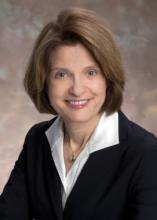Dr. Phillips and colleagues have identified yet another issue that may add to the complexity of surgical training, i.e., pregnancy. Both surgical training and having children are time-sensitive priorities that may conflict with one another and add extra stress to the decision matrix. There is no perfect answer here. So, even after the decision is made to have a child, there will still be many other conflicts coming down the pike.
The key to managing such issues is to realize the following: Be flexible. You can "do it all" but not all at once. You have a whole lifetime to accomplish goals and from time to time, adjustments in plans have to be made: You lead life, it does not lead you. There is no "yellow brick road." This is where surgeons excel. They exhibit strength and courage when facing such conflicts and recognize that they have the skills and stamina to move their lives forward even in the face of complex challenges.
Grace Rozycki, MD, FACS, is the Willis D. Gatch Professor of Surgery and executive vice chair of the department of surgery, Indiana University, Indianapolis.
It would be interesting to compare female surgeons with other professional women of the same age and generation. Many of my friends from high school and college are not physicians, and they are very accomplished in their chosen fields. Many of these women did not identify a life partner until well into their 30s. I think that getting married and having children in the 30- or even 40-year-old age groups reflects a generational trend, partially, but not entirely, attributable to devoting oneself to a career. In addition, many of my group of friends, including myself, married men who had children from previous marriages. Having an "instant" family may further delay or may encourage childbearing. As expected, several of my friends of advanced maternal age experienced complications in their pregnancies and attempted assisted reproduction. Because I was over 40 years old when my husband and I decided to try to get pregnant, I planned to discuss my fertility with my gynecologist, and we were very blessed to discover that we were already pregnant by the time that appointment was scheduled.
As others have said, there is not a perfect time to have a child. The responsibilities and stresses don’t really get better or worse with career progression; they just change. I think it is the responsibility of all professional women with families to support other women in having families, if that is something they choose to do. This effort involves helping one another and making the workplace family friendly. I don’t schedule my conference calls or research team meetings at times that folks might be picking up their children at school or having dinner with their families. I recently convinced our business manager to get an extra refrigerator in a private room for a nurse practitioner who is returning from maternity leave, wants to breast feed, and will need to pump. The American College of Surgeons has offered all-day child care at their meetings for years, and the Society for American Gastrointestinal and Endoscopic Surgeons (SAGES) has recently followed suit. With such support, I have taken my toddler with me to nearly all my professional meetings during the first 3 years of her life, and I don’t hide the fact that being a wife and mother are priorities for me. These new roles have not significantly compromised my career. In fact, they’ve helped me to focus and set priorities. Since the birth of my child, I have been asked to serve in an institutional leadership role as research director for our patient portal, and my first R01 grant proposal was submitted and successfully funded.
Gretchen Purcell Jackson, M.D, Ph.D., FACS, is assistant professor of surgery, pediatrics, and biomedical informatics, Vanderbilt University, Nashville, Tenn.
The issues of childbearing and fertility are complex for women surgeons. It was not clear from the presentation whether the respondents were all in practice. If the respondents are all primarily from the baby-boomer generation, it may alter the survey results. It would be interesting to see the response of current women surgery trainees and to determine whether this is really more of a generational issue or whether the issues relate to the surgical lifestyle.
Certainly, the knowledge of fertility options, financial stability, and ease of access to specialists may also encourage women surgeons to seek intervention at a higher rate than that of the general population.


